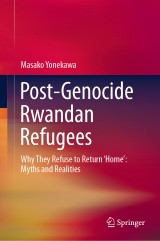Details

Post-Genocide Rwandan Refugees
Why They Refuse to Return ‘Home': Myths and Realities|
CHF 83.00 |
|
| Verlag: | Springer |
| Format: | |
| Veröffentl.: | 05.12.2019 |
| ISBN/EAN: | 9789811067563 |
| Sprache: | englisch |
Dieses eBook enthält ein Wasserzeichen.
Beschreibungen
<p>This book highlights the repeated refusal of post-genocide Rwandan refugees to return ‘home’ and why even high-profile government officials continue to flee to this day. This resistance has taken place for a lengthy period in spite of the fact that genocide ended 25 years ago and the government of Rwanda and the United Nations have assured security in the country. Based on interviews conducted with a number of refugees living in Africa, Europe, and North America, the book explains the high degree of fear and trauma refugees have experienced in the face of the present Rwandan government that was involved in the genocide and other serious crimes both in Rwanda and the neighboring Democratic Republic of Congo. With this book, refugee policies and implementation of the United Nations and some host countries in Africa must be questioned. Some exiles have been stripped of their refugee status in early 2018 and host countries may refoul the refugees back to Rwanda, counter to the principle of<i> non-refoulement</i> (“no expulsion of refugees to a high-risk country”),<i> </i>the cornerstone of asylum and of international refugee law. </p><p> “Forced migration is at the heart of the peacebuilding, conflict and insecurity challenges of the Great Lakes region of Africa. Refugee flows between the DRC and Rwanda have epitomized the human misery of contemporary armed conflict, in particular in the 1990s. Masako Yonekawa provides unique insights that are both politically compelling and deeply moving at the human level. It is written by someone with firsthand experience of the tragedy, and it effectively demonstrates that the humanitarian crisis of forced migration in the region was also a political crisis and a failure of international engagement. It is essential reading for anyone wishing to understand this difficult episode.”</p><p> </p><p>Edward Newman, Professor, School of Politics and International Studies, University of Leeds</p><p></p>
<p></p><p>1 Refugees’ Durable Solution: Voluntary Repatriation and Cessation of the Refugees’ Status.- 2 Process of “Armed Repatriation” of Old-Caseload Tutsi Refugees (1959–1994).- 3 New-Caseload Hutu Refugees’ Flight and Their Refusal to Return (1994–1997).- 4 Post-genocide Refugees’ Continued Refusal to Repatriate (1995–2017).- 5 US Responsibility in the Great Lakes Regional Power Dynamics and Rwandan Refugees.- 6 Conclusion.- Barbara's quote.- Author’s first letter to UNHCR.- References.</p><br><p></p>
Masako Yonekawa,Tsukuba Gakuin University
<p>This book highlights the repeated refusal of post-genocide Rwandan refugees to return ‘home’ and why even high-profile government officials continue to flee to this day. This resistance has taken place for a lengthy period in spite of the fact that genocide ended 25 years ago and the government of Rwanda and the United Nations have assured security in the country. Based on interviews conducted with a number of refugees living in Africa, Europe, and North America, the book explains the high degree of fear and trauma refugees have experienced in the face of the present Rwandan government that was involved in the genocide and other serious crimes both in Rwanda and the neighboring Democratic Republic of Congo. With this book, refugee policies and implementation of the United Nations and some host countries in Africa must be questioned. Some exiles have been stripped of their refugee status in early 2018 and host countries may refoul the refugees back to Rwanda, counter to the principle of<i> non-refoulement</i> (“no expulsion of refugees to a high-risk country”),<i> </i>the cornerstone of asylum and of international refugee law. </p><p> “Forced migration is at the heart of the peacebuilding, conflict and insecurity challenges of the Great Lakes region of Africa. Refugee flows between the DRC and Rwanda have epitomized the human misery of contemporary armed conflict, in particular in the 1990s. Masako Yonekawa provides unique insights that are both politically compelling and deeply moving at the human level. It is written by someone with firsthand experience of the tragedy, and it effectively demonstrates that the humanitarian crisis of forced migration in the region was also a political crisis and a failure of international engagement. It is essential reading for anyone wishing to understand this difficult episode.”</p><p></p><p>Edward Newman, Professor, School of Politics and International Studies, University of Leeds</p>
<p>Is the first book to systematically describe the present situation of Rwandan refugees on three continents</p><p>Warns the international community of the high risk that UNHCR and some host governments in Africa are taking in expelling Rwandan refugees back to their ‘home’ country</p><p>Highlights new testimonies of Rwandan refugees on what happened during their flight from Rwanda to the Congo following the 1994 Rwandan genocide and their lives in refugee camps</p>
Is the first book to systematically describe the present situation of Rwandan refugees on three continents<br> <p>Warns the international community of the high risk that UNHCR and some host governments in Africa are taking in expelling Rwandan refugees back to their ‘home’ country </p> <p>Highlights new testimonies of Rwandan refugees on what happened during their flight from Rwanda to the Congo following the 1994 Rwandan genocide and their lives in refugee camps</p>
Diese Produkte könnten Sie auch interessieren:

Staat ohne Verantwortung?

von: Ludger Heidbrink, Alfred Hirsch, Simon Critchley, Pascal Delhom, Nancy Fraser, Volker Gerhardt, Christoph Hubig, Wolfgang Kersting, Helmut Klages, Tobias Nikolaus Klass, Werner Krawietz, Karl Heinz Ladeur, Renate Mayntz, Richard Münch, Julian Nida-Rümelin, Emmanuel Richter, Gunnar Folke Schuppert, Robert Spaemann, Werner Stegmaier, Michel Vanni

CHF 40.00
















